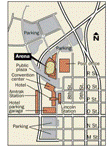Community and Regional Planning Program

Community and Regional Planning Program: Faculty Scholarly and Creative Activity
Document Type
Article
Date of this Version
10-2001
Abstract
Crete, Nebraska, (population 6,028) is on the cutting edge of a global economy in which people are migrating to places that offer jobs and a better quality oflife. In the year 2001, when this study was conducted, Crete's local Farmland pork processing plant was expecting to increase its workforce from 1,200 to 1,650. In today's economy, these 450 new jobs are likely to attract workers from around the world. In recent years, for example, workers have come to Crete from Vietnam, Korea, Laos, Croatia, Serbia, Iraq, and from countries throughout Latin America.
Demographic changes like these are having profound impacts on small rural communities like Crete. They tend to bring renewed economic vigor but they also present a complex array of physical, social, psychological, and cultural challenges. To better understand these challenges from a local perspective, a research team from the College of Architecture at the University of Nebraska-Lincoln has developed a process to allow local residents to express their perceptions of the changing quality oflife in their community. This process provides an opportunity to compare and contrast perceptions of the quality of life among long-term residents (over 15 years in the community) and short-term residents (less than five years in the community).
Based on a series of focus group meetings and an in-depth door-to-door survey of nearly 100 households in Crete, the following conclusions were reached about resident perceptions:
1. Crete residents enjoy a good quality of life.
2. Improvements are needed in providing housing to meet the needs of Crete.
3. Long-term residents tend to feel that conditions are worsening and short-term residents tend to feel conditions are improving.
4. Short-term residents tend to feel higher levels of stress than long-term residents do.
The study concludes with a series of recommended activities that seek to build upon the strengths that Crete offers as a community.


Comments
A study prepared by a research team from the College of Architecture at the University of Nebraska-Lincoln. October 2001. For more information, contact Professor Jim Potter (402) 472-9240.